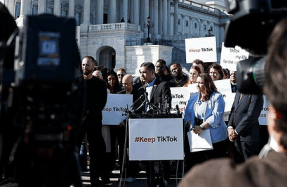SCREEN SAVER

ANY RESEMBLANCE TO STEVE JOBS was unintentional, or so Stacy Spikes claims. Back in February, minutes before Spikes was set to take the stage at Lincoln Center in New York City to announce the resurrection of his old company, MoviePass, he realized he was sweating through his white button-up shirt and jacket. He changed into a more breathable black mock turtleneck, which, on his slim figure, paired with dark jeans, sneakers, and glasses, looked a lot like an homage to the Apple co-founder. “I didn’t want to be thinking, Are they going to see my sweaty pits?” Spikes, 54, says during an interview in a Manhattan office several weeks later. “When people said, ‘That’s very Steve Jobs,’ I was like, ‘Everybody in New York dresses in all black.’”
Spikes will invite the comparison again when his memoir, Black Founder: The Hidden Power of Being an Outsider, arrives in December. For the stark cover, he wore a nearly identical black shirt. Like Jobs, Spikes built a company from scratch only to be pushed out. Like Jobs, he watched from the sidelines as it fell apart. And like Jobs, he will attempt a triumphant return to the business he built.
But while Jobs was self-assured to the point of polarizing colleagues and occasionally the public, Spikes charms you into buying his vision of the future—specifically the future of moviegoing. He asks everyone he meets what films they’ve seen lately. He refuses to disparage a movie (to a journalist, anyway), even when I try to goad him into criticizing some of this year’s Oscar contenders. He’s eager to discuss why his friend might have missed the majesty of Dune’s sandy hills by watching the sci-fi epic at home rather than in an IMAX theater. “An adventure should never come with a pause button,” he says. He loves a dramatic metaphor: during his MoviePass 2.0 presentation, he included a slide of a phoenix rising from the ashes.
Most people who are familiar with MoviePass—and it had more than 3 million members at its peak in the late 2010s—probably remember it as the company that offered cardholders the chance to see one movie per day at the theater of their choice for just $9.95 a month, and then predictably crashed and burned when the deal proved too good to be true.
You’re reading a preview, subscribe to read more.
Start your free 30 days





